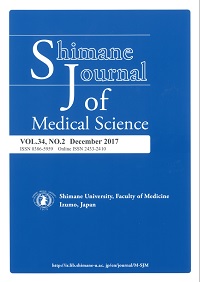Shimane University Faculty of Medicine
ISSN :0386-5959(冊子体)
ISSN :2433-2410(オンライン)


これらの論文は クリエイティブ・コモンズ 表示 - 非営利 - 改変禁止 4.0 国際 ライセンスの下に提供されています。
ダウンロード数 : ? 件
この文献の参照には次のURLをご利用ください : https://ir.lib.shimane-u.ac.jp/53330
Shimane Journal of Medical Science 38 1
2021-03 発行
Effects of Yang-warming and Fluid Retention-resolving Method on the Expression of PI3K-Akt Pathway and Related Apoptotic Proteins in Chronic Heart Failure Rats
内容記述(抄録等)
Chronic heart failure ( CHF ) is one of the most common and also one of the highest mortality diseases, but there is no established effective treatment. The primary molecular mechanism of CHF is the apoptosis of myocardial cells through the PI3K-Akt signaling pathway. So, we investigated the possible mechanism of yang-warming and the fluid retention-resolving method in the treatment of CHF. Methods: The rat model of chronic heart failure was reproduced by intraperitoneal injection of adriamycin. Doppler echocardiography was used to determine rats' cardiac function. ELISA kits detected the levels of BNP and cTnI. H&E staining was used to observe the changes of myocardial pathological morphology in rats. The protein contents of p-PI3K, p-Akt were detected by Western Blot. The expression of Bcl-2 and Bax, and Caspase-8, and Caspase-3 were detected by immunohistochemistry. Results: We revealed that p-PI3K and p-Akt protein expression in the CHF group were decreased, the value of Bcl-2 and Bcl-2/Bax decreased, and the value of Bax, Caspase-8 and 3 increased; All of the treatment groups attenuated the levels of BNP, cTnI, Bax, Caspase-8 and Caspase-3. And the expressions of p-PI3K, p-Akt, Bcl-2, Bcl-2/Bax were increased. The yang-warming group ameliorated the CHF state from the amounts of the releases better than other treatment groups. Conclusions: These revealed that the yang-warming and fluid retention-resolving method might play a role in protecting the myocardium by regulating the PI3K-Akt signaling transduction pathway and subsequently inhibiting apoptosis.
About This Article
DOI
DOI(SelfDOI)
権利関係
Faculty of Medicine, Shimane University
Other Article
PP. 7 - 12
PP. 23 - 31
